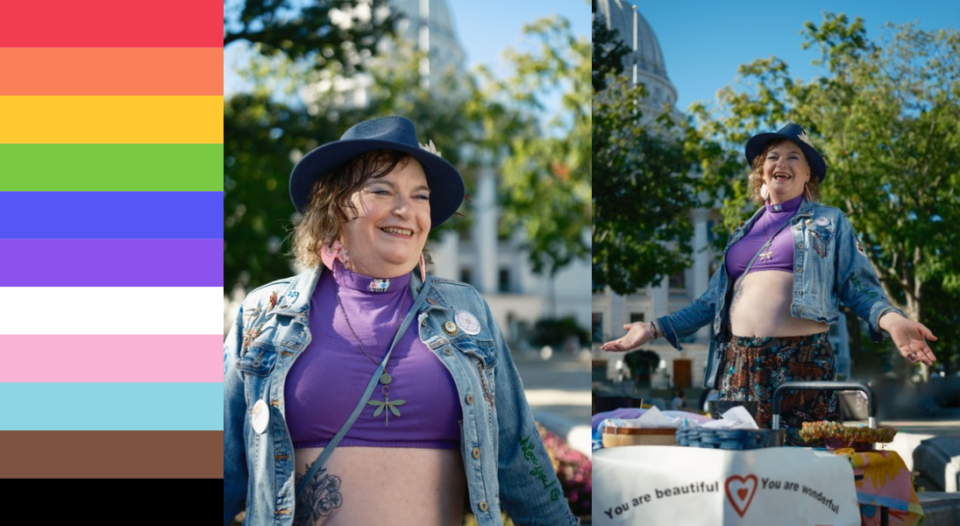June is Pride Month! We are excited to affirm and embrace everyone in the church, and to amplify the voices of our ELCA siblings in the LGBTQIA+ community. Today we are speaking with Vica-Etta Henrietta Steel (she/her).
How are you connected to the ELCA?
I was outside of the Christian faith for decades. Most of the people in my circles are not Christian still. I know their love and feel their love expressed freely, unconditionally. I had no expectation of ever joining the Christian faith. I knew, too well, the harm of the ways words of Scripture have been twisted to weapons held at the heart of our queer family. I felt the weight of Christian communities trying to pray my gay away. So it was to my great surprise that, four years ago, I found myself on a path into Christian faith.
I am a queer woman, openly lesbian, openly transgender. And I have now been in faith leadership for three years. I work at St. John’s Lutheran in Madison, [Wis.], preaching and doing outreach under the guidance of the pastor and the congregation. I just graduated with my master’s in diaconal ministry from Wartburg Theological Seminary. I have a queer social media ministry—@vicavsteel on TikTok and Instagram. You can also find me most Saturdays through the season at the downtown Madison farmers market, speaking inclusive, embracing love, dancing, singing and giving care to the so many who come by my card table chaplaincy.
How does your faith shape and affirm your person/identity?
Jesus took the towel, the pitcher and the basin. Jesus knelt. Jesus washed the feet of the disciples, the women and men, of the people present in discipleship who had no words to describe why the familiar labels of man or woman felt uncomfortable to them then. Jesus washed all, without concern for future actions or just how their faith expressed.
I am humbled at the idea of Jesus, fully human and fully God, kneeling at our feet. Kneeling at my feet. I feel the washing of my feet in hourslong phone calls with a dear friend as we search for words in moments of silence so we do not need to hang up. I wash the feet of my wife when I hold her hand as she holds mine at the end of a hard day. I am called to wash the feet of so many, in acts of care to members of my congregation and in my street chaplaincy. And I find [that] in listening, in being there in service, I not only give care, but I am lifted in the care of so many. How are your feet washed? How do you wash the griefs and missed hopes and struggles of our days so we can each begin anew each day?
How can the ELCA better support and uplift the LGBTQIA+ community?
Look around. Who do you see at the table? Who do you see in the pews? Now ask yourself, does the church work only for those in the pews, or is our call for all our neighbors? Now look further: A dear love, Kayla Zopfi, pointed out in their writings that there are adults in the church, people in their 20s and 30s, the age of Jesus and Jesus’ disciples in the Gospels, who are speaking now of ways the church can become not just affirming but celebratory of all. Are we listening? Are we centering the voices of queer and Black and Indigenous and all people of color? Are the voices of our young centered? Or are all of us from spaces of historic exclusions still only accepted on the fringes? The leadership is already here; let’s learn to hear.
What advice would you give pastors, deacons, bishops or other leaders in the ELCA who are hoping to see more of the LGBTQIA+ community feel affirmed and accepted in the church?
We are called to serve, not to be served. I hear far too many conversations about how we can make people who are queer feel accepted in churches. My purpose, as a queer faith leader, is not to bring queer to church but to hold the door open for our churches to return to queer. In the parable of the wedding feast Jesus tells the disciples—and through them, all of us—to step down from the high table. If we truly step away from our own high tables and into community, our first step is to seek out and follow the people in leadership in our local queer community, disabled community, BIPOC (Black, Indigenous, people of color) communities, and observe how we can be of service. Our call to leadership is in service. How do we seek out service in communities outside our walls?
What gives you hope?
My hope is a defiant hope.
I walk a path up the mountain, toward the love we are called to live in.
My hope is a defiant hope
The path I follow is long and, one day, I find it is washed out in a mudslide. I can go no further.
My hope is a defiant hope.
I turn. I find another path. This one,
this one
is closed by a rockslide.
My hope is a defiant hope.
I follow path after path, and time after time something blocks the way. Yet I will not stop.
My hope is a defiant hope.
I walk down and begin the journey around the mountain until, one day, I will finally find the way forward in love of us all.
My hope is a defiant hope.
My hope will not be silenced.
I have known too many people harmed by the church. I have felt too much harm. Yet I see so much love. I know so many who come around and learn to love again.
My hope will not be silenced.
I know so many leaders, people in their 20s and people across the ages from communities at the corners, women, men, nonbinary people, so many who should never need to shoulder the burdens of leadership, yet they lead.
My hope finds voice.
I walk up the mountain. My hope, defiant.
I walk around the mountain in the company of so many. My hope, never silent.
I hear the leadership of our young and new adults. My hope has a voice.
What do you pray for?
Loving God, our mother, I pray for love, for defiant love, for love that does not demand, for love that will not be stopped. I pray for love that is not sensible. Love that stays up for hours, talking and listening and being and truly hearing. Love that is so queer in all the gender-ful queerness of God.
Loving God, so transgressive, transcendently crossing boundaries and binaries in gender-ful love, help us see that in Jesus’ reincarnation, carrying the wounds inflicted by human sin, we who carry the wounds of human exclusions need not shy from the wound, and though wounded, we can also live in joy, justice and love. Help us feel your hand holding ours as we live into our loving, sexual, joyful bodies, all of us in the Imago Dei. And as we know grief and joy separately, and as we know grief and joy in simultaneity, help us feel you sitting with us, help us know your love.
Loving God, let us feel your breath carrying us over and around our mountains.





